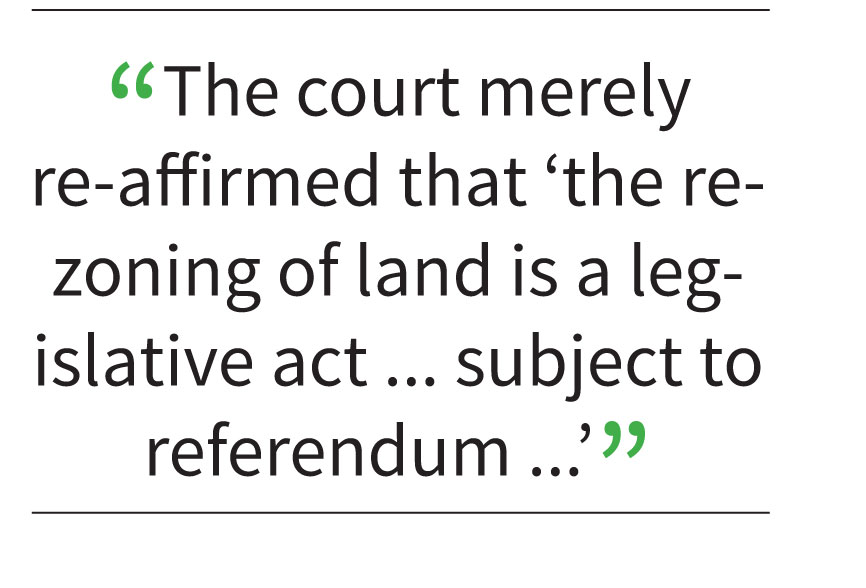Published in the September 26 – October 9, 2018 issue of Morgan Hill Life
By Randy Toch

Randy Toch
A unanimous California State Supreme Court last month decided the Morgan Hill City Council was wrong to deny residents their lawful right to vote on whether to accept or reject a proposed zoning amendment. The city council originally passed the zoning change in 2015 that affects a 3.3-acre vacant parcel located on the southeast corner of Lighthouse Avenue and Madrone Parkway. In the case of City of Morgan Hill v. Bushey the State Supreme court decided Aug. 23 that it was illegal for the city council to refuse to either repeal the proposed zoning change or else call for a referendum election before it could become law.
If it had been allowed to become law, the Proposed Ordinance 2131 — New Series would permit hotel use on the parcel. That use would double the value of the property an estimated increase in value of more than $2 million, money that would most likely not be assessable for property taxes. The parcel is owned by River Park Hospitality, Inc., a real estate developer/land speculator based in Fresno County.
Zoning laws exist for the public good. No one has a right to demand a law be changed just to make them money. There are many parcels in Morgan Hill that allow hotel use. Rather than purchase any of those properties, River Park Hospitality, Inc., purchased far less expensive land not zoned for hotel use. It then tried to get the city to change its laws so they could then have a hotel there anyway.
 The court’s decision confirmed the people’s right under the State Constitution to hold a referendum election on proposed legislation, including zoning changes and general plan amendments. In a city the size of Morgan Hill, a referendum petition must be signed by at least 10 percent of the voters and submitted to the city clerk within 30 days after the challenged city council action. In the case of proposed zoning ordinance change, a referendum petition needed the signatures of 2,050 registered Morgan Hill voters. The Santa Clara County Registrar of Voters certified more than 2,500 valid signatures.
The court’s decision confirmed the people’s right under the State Constitution to hold a referendum election on proposed legislation, including zoning changes and general plan amendments. In a city the size of Morgan Hill, a referendum petition must be signed by at least 10 percent of the voters and submitted to the city clerk within 30 days after the challenged city council action. In the case of proposed zoning ordinance change, a referendum petition needed the signatures of 2,050 registered Morgan Hill voters. The Santa Clara County Registrar of Voters certified more than 2,500 valid signatures.
The Supreme Court opinion does not make any type of final decision about the parcel or the project. It also does not usurp any city authority or private property rights. The court merely re-affirmed that “the rezoning of land is a legislative act . . . subject to referendum” as it had previously stated in the 1984 case of Yost v. Thomas.
In this case about a proposed rezoning of property to allow a specific commercial use, the attorneys for the city council attempted to rely on a 33-year-old case out of the Fourth District of the Court of Appeal in Riverside County that dealt with rezoning of residential properties. Both the Court of Appeal and the Supreme Court rejected that argument and went further to disapprove of that opinion. In its 24-page unanimous opinion, the Supreme Court methodically rejected virtually every argument that the city of Morgan Hill and River Park Hospitality, Inc. made to the court in attempting to justify the city council’s refusal to process a lawful petition for referendum concerning proposed ordinance 2131-NS. In fact, the Supreme Court decision states that the judges in the case on which the city council attempted to rely had “misapprehended” the applicable law in this matter.
The unanimous opinions of both the Supreme Court and the Court of Appeal make it clear that the right to referendum continues to apply to proposed zoning changes. We might never know why the city council chose to ignore the clear language of the California State Constitution, the California Elections Code, and the Supreme Court’s holding in Yost, and to instead follow — and pay handsomely — attorneys who were apparently able to convince a majority of the councilmembers that a lower court case which “misapprehended” the law and which had been questioned or even ignored in multiple court of appeal opinions had somehow overturned the Supreme Court’s decision that referendum applies to zoning. To her enduring credit, former then Councilmember Marilyn Librers voted against the proposed zoning change and was the sole council member who voted against the city council pursuing the failed litigation.
The upshot is that the Supreme Court has now issued a clear decision confirming that the city council was wrong to not follow the law three and a half years ago and allow the people to vote on the zoning change. So stand by folks. Unless the city council finally votes to repeal proposed ordinance 2131-NS, and adopt a different commercial zoning designation that does not allow hotel use, someday, in the not too distant future, voters will be asked to decide on whether or not the River Park Hospitality, Inc. parcel should be rezoned to allow hotel use. The pros and cons will be argued and debated and then the public will decide. This is the law as it was enacted in 1911, and this is as it should have been in 2015.
Randy Toch is a Morgan Hill attorney who represented the Hotel Coalition that fought the city’s rezoning of parcel.






